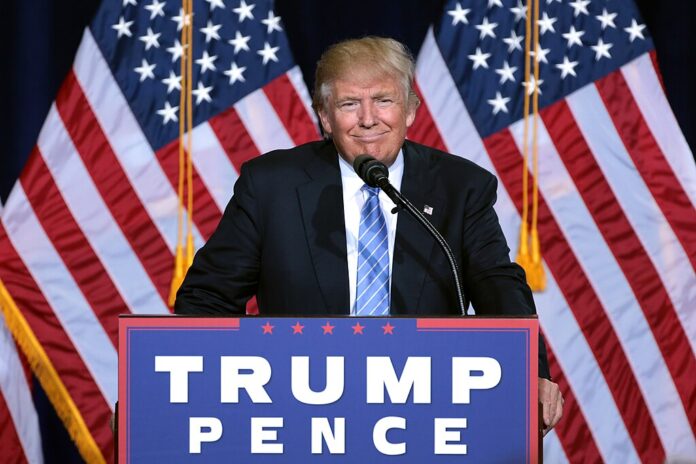Former President Donald Trump prepares to announce his vice presidential candidate ahead of the Republican National Convention, with several key contenders vying for the role
Former President Donald Trump is gearing up for a pivotal announcement as he narrows down his choices for vice president, a decision set to influence the dynamics of the upcoming Republican National Convention and the broader 2024 election campaign. With the unveiling expected just before or during the convention in Milwaukee starting July 15, Trump’s selection of a running mate will be crucial in shaping both the current election cycle and future Republican leadership prospects.
Among the top contenders are familiar faces known for their allegiance to Trump and their potential to complement his candidacy. North Dakota Governor Doug Burgum, with a background in software and real estate, stands out for his financial success and close personal rapport with Trump. Despite his age, Burgum’s loyalty and ability to attract donors could bolster Trump’s bid.
Embed from Getty ImagesOhio Senator JD Vance, propelled into national prominence by his bestselling memoir “Hillbilly Elegy,” has transitioned from Trump critic to ally. His youthful appeal and advocacy for Trump’s agenda on trade and immigration make him a strong contender, though past criticisms of Trump could pose challenges.
Florida Senator Marco Rubio offers foreign policy expertise and appeals to Hispanic voters, potentially broadening Trump’s electoral base. However, their previous acrimonious relationship and residency issues complicate Rubio’s candidacy.
South Carolina Senator Tim Scott, the only Black Republican in the Senate, brings racial diversity and evangelical fervor to the ticket. His alignment with Trump on key policies and outreach to minority voters are significant strengths, although questions linger about his debate performance.
Representative Elise Stefanik from New York, once a moderate Republican, has transformed into a staunch Trump supporter, known for her defense of Trump during his impeachment trials. As the only woman on the shortlist, Stefanik could help attract female voters disenchanted with Biden, but her relative lack of executive experience may be a concern.
Ben Carson, former HUD Secretary and renowned neurosurgeon, offers a unifying figure as the first Black person on a Republican presidential ticket. His calm demeanour and loyalty to Trump are assets, though past controversial remarks on policy issues could overshadow his candidacy.
Representative Byron Donalds of Florida, a vocal Black conservative, appeals to younger voters and could bolster Trump’s support among minorities. However, residency issues and controversial statements present potential obstacles.
Trump’s decision-making process is characterized by unpredictability, with factors such as debate performance, fundraising ability, and media presence influencing his choice. The announcement, slated to precede or coincide with the convention, will set the tone for the general election campaign against Democratic President Joe Biden.
Analysis:
Political Perspective:
Trump’s VP selection holds significant political implications, aiming to solidify his base while appealing to swing voters and minority communities. Each candidate represents a strategic choice to enhance Trump’s electoral prospects and influence party dynamics. The decision reflects Trump’s strategy to consolidate support within the Republican Party and position himself for a potential second term, highlighting loyalty and alignment with his agenda as critical factors.
Social Perspective:
The VP selection underscores societal debates on diversity and representation within the Republican Party. Candidates like Tim Scott and Byron Donalds bring racial diversity to the ticket, addressing criticisms of the GOP’s demographic homogeneity. This reflects broader societal trends towards inclusivity and political representation, shaping public perceptions of the party’s commitment to diversity amidst ongoing social discourse.
Racial Perspective:
The inclusion of Tim Scott and Byron Donalds on Trump’s shortlist highlights efforts to appeal to Black voters and challenge perceptions of Republican outreach. Their presence signifies a strategic move to diversify the party’s leadership and appeal to minority communities, addressing historical underrepresentation while navigating complex racial dynamics within American politics.
Gender Perspective:
Elise Stefanik’s candidacy as the sole woman on Trump’s shortlist raises questions about gender dynamics and female representation in conservative politics. Her selection could attract female voters disillusioned with Biden, emphasizing issues of gender equality and women’s political empowerment within the Republican Party’s electoral strategy.
Economic Perspective:
Candidates like Doug Burgum and Marco Rubio bring economic credentials and fundraising prowess to Trump’s campaign, essential for financing a competitive election bid. Their business backgrounds and financial networks strengthen the GOP’s economic messaging, appealing to affluent donors and underscoring economic priorities in Trump’s electoral strategy.
